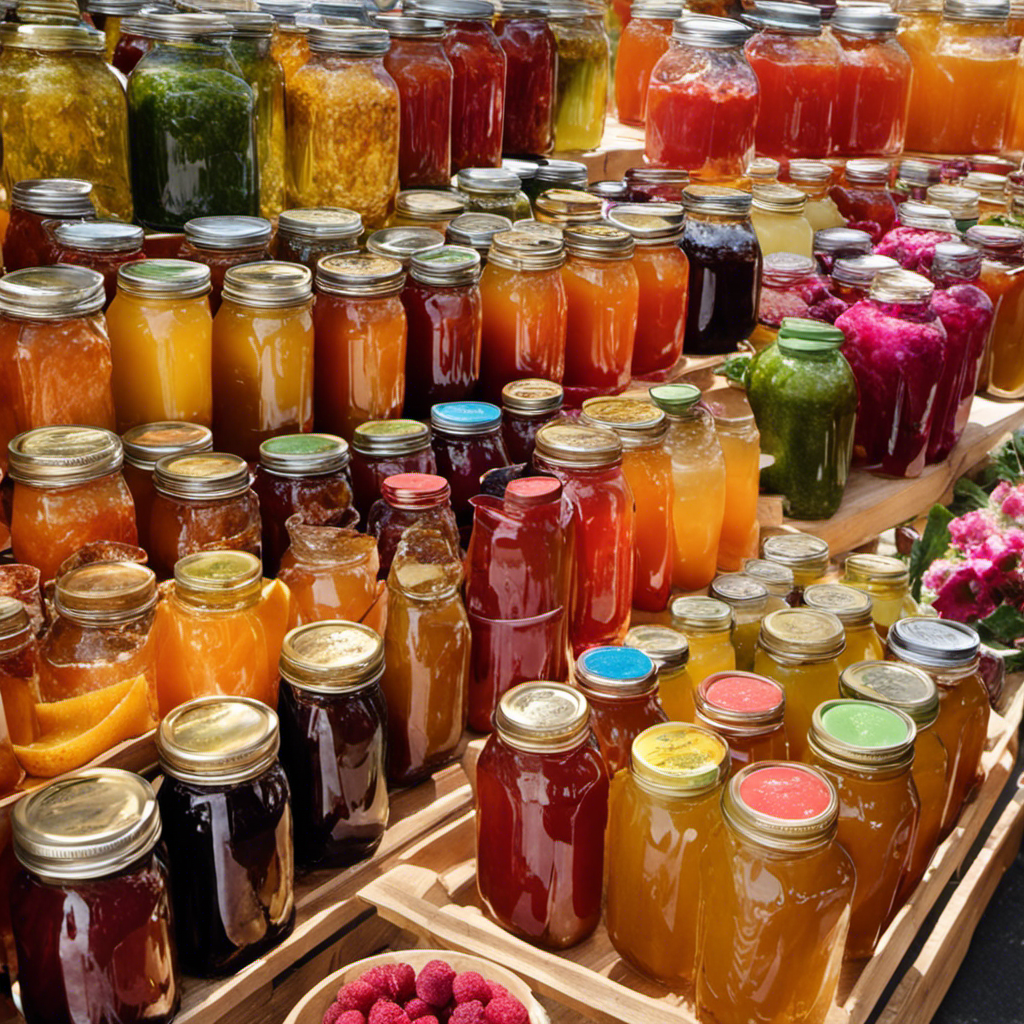Turmeric Tea
Can Turmeric Help In Conception

As someone who has struggled with infertility, I know firsthand the emotional toll that trying to conceive can take on an individual or couple. There are countless remedies and treatments available, but sometimes it can feel overwhelming to navigate which ones are safe and effective.
Recently, I’ve been hearing more about the potential benefits of turmeric for fertility and wanted to investigate further. Turmeric, a spice commonly used in Indian and Middle Eastern cuisine, has been touted for its anti-inflammatory properties and potential health benefits. But can it actually help with conception?
In this article, we’ll explore the scientific evidence behind turmeric’s properties, the connection between turmeric and fertility, any potential risks or side effects, and how to incorporate this spice into your diet. Additionally, we’ll take a look at other natural remedies for fertility that may be worth considering.
Key Takeaways
- Turmeric’s anti-inflammatory and antioxidant properties may contribute to improving fertility and increasing chances of conception.
- Turmeric’s active compound, curcumin, reduces inflammation in the body by inhibiting the activity of inflammatory enzymes, which can damage eggs and sperm and hinder the implantation process.
- Turmeric supplements and tea act as fertility boosters by regulating hormones, reducing inflammation, and having antioxidant properties, but high doses may have potential risks and side effects such as gastrointestinal issues and interaction with certain medications.
- Lifestyle changes such as maintaining a healthy weight and reducing stress, as well as incorporating other natural remedies like herbs and supplements such as zinc, vitamin D, and omega-3 fatty acids, can also improve fertility, but medical intervention may be necessary if trying to conceive for over a year (or six months if over 35).
Understanding Turmeric’s Properties
Turmeric’s anti-inflammatory and antioxidant properties may potentially contribute to improving fertility and increasing chances of conception. The active compound in turmeric, curcumin, has been found to reduce inflammation in the body by inhibiting the activity of inflammatory enzymes. Chronic inflammation in the reproductive system can lead to damage to the eggs and sperm, as well as hinder the implantation process.
Therefore, incorporating turmeric into one’s diet may help to reduce inflammation in the reproductive system, leading to a healthier environment for conception. Moreover, turmeric’s antioxidant properties may also play a role in improving fertility. Antioxidants help to protect the body from free radicals, which can damage cells and lead to oxidative stress.
Oxidative stress has been linked to infertility, as it can damage the reproductive organs and cause damage to the eggs and sperm. Thus, consuming turmeric, which is rich in antioxidants, may help to reduce oxidative stress in the reproductive system, ultimately improving fertility. The connection between turmeric and fertility is not a new concept, and research has suggested that incorporating this spice into one’s diet may have positive effects on reproductive health.
The Connection Between Turmeric and Fertility
By adding a pinch of turmeric to my meals regularly, I may increase my chances of starting a family sooner than I thought. Studies have shown that turmeric supplements and turmeric tea act as fertility boosters.
Curcumin, the active ingredient in turmeric, has been found to regulate hormones, reduce inflammation, and have antioxidant properties, all of which are essential for reproductive health.
Turmeric has been used for centuries in traditional medicine to treat a range of ailments, including infertility. However, it’s important to note that while turmeric is generally considered safe, high doses may have potential risks and side effects.
In the subsequent section, I’ll discuss these potential risks and side effects of turmeric consumption.
Potential Risks and Side Effects
However, it’s important to be aware of the potential risks and side effects of consuming turmeric. While turmeric is generally considered safe when used in food or as a spice, consuming it in large amounts or as a supplement may cause adverse reactions.
Some people may experience gastrointestinal issues such as nausea, diarrhea, and stomach upset. Turmeric may also interact with certain medications, such as blood thinners, and may increase the risk of bleeding.
To avoid potential risks and side effects, it’s important to take precautions when incorporating turmeric into your diet. Start with small amounts and gradually increase the dosage as tolerated. Always consult with a healthcare provider before taking turmeric supplements, especially if you’re pregnant, breastfeeding, or have any medical conditions.
By taking these precautions, you can safely enjoy the benefits of turmeric in your diet. In the next section, we’ll explore some easy ways to incorporate turmeric into your daily meals.
How to Incorporate Turmeric into Your Diet
If you’re looking to add some flavor and color to your meals, incorporating turmeric into your diet can be a great option. Not only does it offer a variety of health benefits, but it can also help with fertility.
Here are some ways to incorporate turmeric into your diet:
- Turmeric tea: Boil water and add turmeric powder, ginger, and honey for a warming and soothing tea.
- Turmeric rice: Add turmeric powder and coconut milk to your rice for a flavorful and colorful side dish.
- Turmeric smoothies: Blend turmeric powder with coconut milk, banana, and pineapple for a refreshing and healthy smoothie.
- Turmeric supplements: If you’re not a fan of the taste of turmeric, you can also take it in supplement form.
In addition to incorporating turmeric into your diet, there are also turmeric recipes available online that can help you get more creative with this spice. However, it’s important to note that turmeric supplements should be taken in moderation and under the guidance of a healthcare professional.
With these tips, you can start reaping the benefits of turmeric for fertility and overall health. Moving forward, let’s explore other natural remedies for fertility.
Other Natural Remedies for Fertility
In addition to incorporating turmeric into my diet, I’ve also looked into other natural remedies for improving fertility.
Lifestyle changes such as maintaining a healthy weight and reducing stress can have a positive impact on fertility.
Other herbs and supplements, such as maca root and evening primrose oil, may also be worth considering, but it’s important to discuss with a healthcare provider before taking them.
If these natural remedies don’t improve fertility, medical intervention may be necessary, and it’s important to know when to consider it.
Lifestyle Changes to Improve Fertility
To boost your chances of conceiving, making small lifestyle changes can be like planting seeds in a garden – they may take time, but they can lead to a bountiful harvest. Here are some lifestyle changes that can help improve fertility:
-
Follow dietary recommendations: A healthy and balanced diet can help improve fertility. Include plenty of fruits, vegetables, whole grains, lean protein, and healthy fats in your diet. Avoid processed foods, sugary drinks, and excessive caffeine and alcohol consumption. It’s also important to maintain a healthy weight, as being overweight or underweight can affect fertility.
-
Exercise regularly: Regular exercise can help improve fertility by reducing stress and maintaining a healthy weight. Aim for at least 30 minutes of moderate-intensity exercise most days of the week. However, avoid over-exercising, as excessive exercise can also affect fertility.
-
Manage stress: Chronic stress can affect fertility by disrupting the menstrual cycle and ovulation. Practice stress-reducing techniques such as yoga, meditation, or deep breathing exercises.
-
Quit smoking: Smoking can decrease fertility in both men and women by damaging the reproductive system. Quitting smoking can improve fertility and overall health.
Incorporating these lifestyle changes can improve your chances of conceiving. However, it’s important to note that these changes may take time to show results. In the next section, we’ll explore other herbs and supplements to consider.
Other Herbs and Supplements to Consider
Adding certain herbs and supplements to your daily routine may be worth considering when trying to improve fertility. Turmeric, a spice commonly used in Indian cuisine, has gained popularity in recent years for its potential health benefits. It contains an active ingredient called curcumin, which has anti-inflammatory properties and may help regulate hormones related to fertility. While research on turmeric and fertility is limited, some studies suggest that it may improve sperm quality and increase ovulation in women.
However, it’s important to note that there are no official dosage guidelines for using turmeric for fertility, and it’s always best to consult with a healthcare provider before starting any new supplement. Other popular options for improving fertility include supplements like zinc, vitamin D, and omega-3 fatty acids. Zinc is important for sperm production and can be found in foods like oysters, beef, and pumpkin seeds.
Vitamin D, which is important for overall health and hormone regulation, can be obtained through sun exposure or supplements. Omega-3 fatty acids, found in fish oil supplements or fatty fish like salmon, may improve ovulation and sperm quality. While these supplements may be helpful for some people, it’s important to remember that they are not a substitute for medical treatment.
If you have been trying to conceive for over a year (or six months if you’re over 35), it may be time to consider medical intervention.
When to Consider Medical Intervention
If you’re struggling to start your family and nothing seems to be working, it might be time to seek medical intervention. There are various medical options available for individuals and couples who are having difficulty conceiving.
Fertility treatments can range from medications that stimulate ovulation to assisted reproductive technologies such as in vitro fertilization (IVF).
It’s important to remember that seeking medical intervention for infertility does not mean giving up on natural methods or alternative remedies. In fact, many doctors may encourage patients to continue using complementary therapies such as herbs and supplements, as long as they’re safe and not interfering with medical treatments.
However, it’s essential to discuss any supplements or herbs you’re taking with your doctor, as they may interact with medications or affect your fertility in unexpected ways. Ultimately, it’s up to each individual to decide what combination of medical and alternative approaches feels right for them.
Frequently Asked Questions
Is turmeric safe to consume during pregnancy?
During pregnancy, consuming turmeric in moderate amounts as a spice in food is generally safe. However, taking turmeric supplements during conception may increase the risk of miscarriage or bleeding. Consult with your healthcare provider before using turmeric.
Can turmeric be used as a form of birth control?
No, there is no evidence to suggest that turmeric can be used as a form of birth control. While turmeric has been studied for its potential health benefits, there is no scientific evidence linking turmeric and contraception.
Can turmeric improve male fertility?
Well, if you’re looking to spice up your bedroom performance, turmeric might just be the answer. Studies have shown that this golden spice can improve male sperm count and even reduce the risk of erectile dysfunction.
How much turmeric should be consumed daily for fertility benefits?
I take a daily dose of 500-1,000mg of turmeric supplements for fertility benefits. Studies suggest that turmeric’s anti-inflammatory properties may improve sperm quality and boost ovulation. However, more research is needed on its effectiveness for conception.
Are there any medical conditions that could make turmeric consumption dangerous for fertility?
I learned that individuals with PCOS have an increased risk of developing fertility problems. Additionally, consuming turmeric may interact with certain medications, potentially becoming a danger for fertility.
Conclusion
In conclusion, while turmeric may have some potential benefits for fertility, it shouldn’t be relied upon as a magical solution. It’s important to consult with a healthcare provider before incorporating any new supplement or herb into your diet and to be aware of potential risks and side effects.
Additionally, it’s important to recognize that fertility is a complex issue and there are many factors that can impact it, such as age, overall health, and lifestyle habits. One possible objection to using turmeric for fertility is the idea that it may not work for everyone. While there is some evidence to suggest that turmeric may be helpful for certain individuals, it’s not a guaranteed solution.
However, it’s important to remember that even if turmeric doesn’t work for everyone, it may still be a useful addition to a healthy diet and lifestyle. By incorporating a variety of natural remedies and healthy habits, individuals can increase their chances of conceiving and maintaining a healthy pregnancy. Ultimately, the decision to use turmeric or any other natural remedy for fertility should be made in consultation with a healthcare provider and with a full understanding of the potential risks and benefits.
In the vast and diverse world of coffee, coffee alternatives, and tea, Olivia has found her calling. As an author and a dedicated coffee and tea aficionado, her work for Cappuccino Oracle reflects her profound love and understanding of the intricate complexities found within these beverages. Olivia’s passion for the subject serves as both a catalyst for her creativity and a connection point with her audience.
Olivia’s appreciation for coffee, coffee alternatives, and tea blossomed at an early age. She discovered that these beverages invigorated her senses and stimulated her creative spirit. From the nuanced flavors of single-origin roasts to the captivating narratives intertwined with coffee, coffee alternatives, and tea trade and culture, Olivia found an unlimited source of inspiration in her daily cup.
Her love for these beverages and her talent for storytelling eventually converged at Cappuccino Oracle. As an author, Olivia’s mission is to illuminate the intricate tapestry that makes up the world of coffee, coffee alternatives, and tea. Her articles span a diverse range of topics, encompassing everything from the unique flavors of different brews to the sociocultural history intertwined with their cultivation and consumption.
Turmeric Tea
What Tea Is the Base of Humm Kombucha

Being a fan of tea, I was intrigued to explore the history of Humm Kombucha’s beverage. I was eager to discover the mystery behind the delicious flavors that tantalize my palate.
So, what tea is the base of Humm Kombucha? Join me on this flavorful journey as we explore the different tea varieties that Humm Kombucha uses and how they infuse them into their brews.
Discover the benefits of using tea as a base and its crucial role in creating the unique flavor profile of Humm Kombucha.
Key Takeaways
- Humm Kombucha sources tea from various regions around the world.
- The choice of tea greatly impacts the flavor and fermentation process.
- Humm Kombucha carefully selects high-quality, organic teas from around the world.
- Different tea varieties contribute distinct flavors and health benefits.
The Origin of Humm Kombucha’s Tea Base
The tea that Humm Kombucha uses as its base is sourced from various regions around the world. The history of kombucha brewing dates back centuries, originating in East Asia. Traditionally, black or green tea is used as the base for fermentation.
The type of tea used can greatly impact the flavor and fermentation process of kombucha. Black tea, with its rich and bold taste, provides a strong foundation for the fermentation process, resulting in a robust and complex flavor profile. Green tea, on the other hand, lends a more delicate and grassy taste to the kombucha.
The choice of tea also affects the color of the final product, with black tea producing a darker brew and green tea resulting in a lighter, more golden hue. Careful selection and sourcing of tea is crucial in creating the unique and high-quality kombucha that Humm offers.
Exploring the Different Tea Varieties in Humm Kombucha
One of the key factors in the variety of flavors in Humm Kombucha is the type of tea used as the base. By exploring different tea varieties, Humm Kombucha is able to create a range of flavors that cater to various tastes and preferences. Each tea variety brings its own unique characteristics and health benefits to the kombucha. Here is a table showcasing some of the tea varieties used in Humm Kombucha and their respective flavor profiles and health benefits:
| Tea Variety | Flavor Profile | Health Benefits |
|---|---|---|
| Green Tea | Fresh, grassy | Antioxidant-rich |
| Black Tea | Rich, robust | Boosts heart health |
| White Tea | Delicate, floral | Promotes healthy skin |
| Oolong Tea | Complex, fruity | Aids digestion |
With this diverse range of tea varieties, Humm Kombucha offers a flavor for everyone, while also providing various health benefits.
How Humm Kombucha Infuses Tea Into Their Brews
By exploring different tea varieties, Humm Kombucha’s brews are infused with a range of flavors and health benefits. The infusion techniques used by Humm Kombucha are carefully selected to ensure the perfect balance of taste and nutrition.
The tea selection process starts with sourcing high-quality, organic teas from around the world. Each tea is then brewed to perfection, using specific infusion techniques to extract the unique flavors and health properties.
Here are three reasons why Humm Kombucha’s infusion techniques and tea selection are truly exceptional:
-
The careful selection of teas results in a diverse range of flavors, from the bold and earthy notes of black tea to the delicate and floral undertones of green tea.
-
The infusion techniques used by Humm Kombucha allow for the extraction of the full spectrum of health benefits present in the teas, ensuring that each sip is not only delicious but also nourishing for the body.
-
The attention to detail in the tea selection and infusion techniques reflects Humm Kombucha’s commitment to creating a high-quality product that promotes overall well-being.
With every sip of Humm Kombucha, you can taste the expertise and passion that goes into each brew.
The Benefits of Using Tea as a Base in Humm Kombucha
Using tea as a foundation in Humm Kombucha brings a multitude of health benefits and rich flavors to each brew. Tea is not only a delicious beverage on its own, but it also adds depth and complexity to the kombucha flavor profile. The infusion of tea in the brewing process creates a unique taste that is both refreshing and satisfying. The origins of tea can be traced back thousands of years, and today there are countless varieties to choose from. Each variety of tea brings its own distinct flavors and health benefits to the kombucha.
| Benefits | Health | Taste |
|---|---|---|
| Rich in antioxidants | Boosts immune system | Subtle and floral |
| Promotes digestion | Improves gut health | Bold and earthy |
| Reduces inflammation | Increases energy | Light and refreshing |
| Supports heart health | Enhances mental focus | Sweet and fruity |
The role of tea in the flavor profile of Humm Kombucha is undeniable. The infusion of different tea varieties adds layers of complexity and depth to the overall taste, making each sip a delightful experience.
The Role of Tea in the Flavor Profile of Humm Kombucha
The infusion of various tea varieties in Humm Kombucha creates a delightful and complex flavor profile. The impact on the fermentation process is significant, as the tea acts as the base for the kombucha culture to thrive and ferment. The choice of tea also plays a crucial role in the health benefits of Humm Kombucha.
Here’s why:
-
Green tea: Packed with antioxidants, green tea provides a refreshing and vibrant flavor to Humm Kombucha. It also promotes metabolism and aids in weight management.
-
Black tea: With its bold and robust taste, black tea adds depth to the flavor profile of Humm Kombucha. It is known for its potential to improve heart health and reduce the risk of chronic diseases.
-
Herbal tea: Infusing Humm Kombucha with herbal teas like chamomile or peppermint adds a soothing and calming element to the drink. These teas are known for their relaxation and digestive benefits.
The combination of different tea varieties in Humm Kombucha creates a harmonious blend of flavors that not only pleases the palate but also contributes to the overall well-being of the consumer.
Frequently Asked Questions
What Is the Recommended Daily Intake of Humm Kombucha for Optimal Health?
For optimal health, the recommended daily intake of Humm Kombucha varies depending on individual factors. It’s important to listen to your body and start with a smaller amount to avoid potential side effects.
How Long Does It Take for Tea to Infuse Into the Brew During the Fermentation Process?
During the fermentation process of Humm Kombucha, the tea infusion time can vary depending on factors such as temperature, tea type, and desired flavor intensity. It typically takes a few days for the tea to fully infuse into the brew.
Are There Any Specific Health Conditions That Could Be Negatively Affected by Consuming Humm Kombucha?
Negative effects of consuming Humm Kombucha may impact individuals with certain health conditions. It’s important to consult a healthcare professional if you have concerns.
Does Humm Kombucha Use Any Artificial Flavors or Sweeteners in Their Products?
Humm Kombucha does not use any artificial flavors or sweeteners in their products. This is great for gut health as it ensures a natural and wholesome experience when enjoying their delicious kombucha.
Can the Tea Base in Humm Kombucha Be Traced Back to Specific Tea Plantations or Regions?
Yes, the tea base in Humm Kombucha can be traced back to specific tea plantations or regions. This allows for the sourcing of high-quality teas with distinct flavors and potential health benefits.
Conclusion
In conclusion, the tea base of Humm Kombucha plays a crucial role in the flavor profile and overall quality of their brews. By carefully selecting and infusing different tea varieties, Humm Kombucha is able to create a diverse range of flavors that cater to various taste preferences.
Not only does tea provide a rich and complex taste, but it also offers numerous health benefits. So, next time you enjoy a bottle of Humm Kombucha, take a moment to appreciate the incredible depth and nuance that tea brings to this refreshing beverage.
Can you imagine a world without the exquisite infusion of tea in Humm Kombucha?
Noah, the Editor-in-Chief at Cappuccino Oracle, plays a pivotal role in shaping the voice and vision of our renowned platform. With an unwavering passion for coffee, coffee alternatives, and tea, Noah leads Cappuccino Oracle towards new horizons in the realm of coffee journalism.
Beyond his professional responsibilities, Noah serves as a mentor and guiding force for his team. His dedication to journalistic excellence and genuine love for coffee, coffee alternatives, and tea continue to inspire and motivate the Cappuccino Oracle family. In the ever-evolving world of these beverages, Noah’s leadership ensures that our platform remains at the forefront, delivering enlightening and enjoyable content to our readers worldwide.
Turmeric Tea
What Brands Opf Kombucha Are Brewed in Green Tea

Hello there, kombucha lovers!
I’ve got some exciting news for you – today, we’re diving into the world of green tea kombucha.
If you’re like me and can’t resist the refreshing and health-boosting qualities of kombucha, then you’re in for a treat.
In this article, I’ll be sharing the top brands of kombucha that are brewed in green tea, along with some fascinating science behind this delightful beverage.
So, grab a glass and get ready to discover the wonderful world of green tea kombucha!
Key Takeaways
- GT’s Kombucha offers a wide range of flavors and high-quality ingredients.
- Health-Ade specializes in small-batch brewing with organic ingredients.
- Brew Dr. Kombucha offers unique flavors with green tea and medicinal herbs.
- Kevita provides a tangy and slightly sweet flavor profile with their own probiotic culture.
Health Benefits of Green Tea Kombucha
If you’re looking to boost your overall health, you should try drinking green tea kombucha for its numerous health benefits. Green tea kombucha is a fermented beverage made from combining green tea and a symbiotic culture of bacteria and yeast (SCOBY).
It is rich in antioxidants, which can help protect your cells from damage caused by free radicals. Green tea kombucha also contains beneficial probiotics that can support a healthy gut microbiome and improve digestion. Additionally, it may help boost your immune system, lower cholesterol levels, and promote weight loss.
To make green tea kombucha at home, you’ll need green tea leaves, sugar, and a SCOBY. However, it’s important to note that there are potential health risks associated with consuming homemade kombucha, such as contamination or excessive consumption of alcohol. Therefore, it’s advisable to follow a trusted green tea kombucha recipe and consume it in moderation.
Top 5 Green Tea Kombucha Brands to Try
Among the top choices for trying green tea kombucha are five brands that are worth exploring. Here are four notable options:
-
GT’s Kombucha: Known for their wide range of flavors and high-quality ingredients, GT’s Kombucha offers several green tea-based options. Their kombucha is brewed using a traditional fermentation process that involves a SCOBY (symbiotic culture of bacteria and yeast) and a blend of green tea and sugar.
-
Health-Ade: This brand focuses on small-batch brewing and uses only organic ingredients. Health-Ade‘s green tea kombucha is made with a blend of organic green tea, cane sugar, and their signature SCOBY. The fermentation techniques used ensure a balanced and smooth flavor profile.
-
Brew Dr. Kombucha: Utilizing a combination of green tea and medicinal herbs, Brew Dr. Kombucha creates unique and refreshing flavors. Their fermentation process involves a blend of green tea, sugar, and a proprietary culture, resulting in a vibrant and effervescent kombucha.
-
Kevita: Kevita‘s green tea kombucha is crafted using a combination of green tea, organic cane sugar, and their own probiotic culture. Their fermentation techniques create a tangy and slightly sweet flavor profile that is both refreshing and invigorating.
These brands showcase the diverse range of kombucha brewing processes and fermentation techniques used to create delicious and healthful green tea kombucha options.
The Science Behind Green Tea Kombucha
The science behind making green tea kombucha involves a fermentation process that combines bacteria and yeast cultures with sugar to create a tangy and probiotic-rich beverage. During fermentation, the bacteria and yeast consume the sugar, producing carbon dioxide and various acids. This process can take anywhere from a week to a month, depending on the desired flavor and strength.
The antioxidants present in green tea are also preserved during fermentation, providing numerous health benefits. Green tea is known for its high levels of catechins, which are powerful antioxidants that help to reduce inflammation and protect against cell damage. These antioxidants are then present in the final kombucha product, making it a great way to enjoy the benefits of green tea in a refreshing and probiotic drink.
Now, let’s explore how to make green tea kombucha at home.
How to Make Green Tea Kombucha at Home
First, you’ll need to gather the necessary ingredients and equipment for making homemade kombucha. Here’s what you’ll need:
- Green tea bags or loose leaf green tea: Choose a high-quality green tea for the best flavor and health benefits.
- Sugar: This will be the food for the kombucha culture, so make sure to use plain white sugar.
- SCOBY: This stands for Symbiotic Culture of Bacteria and Yeast, and it is the key ingredient that ferments the tea.
- Glass jar and cloth cover: Use a large glass jar to ferment the kombucha and cover it with a cloth to allow airflow while keeping out contaminants.
Now, let’s talk about the benefits of adding fruit to green tea kombucha. Adding fruit not only enhances the flavor but also adds additional vitamins, minerals, and antioxidants to the drink. You can experiment with different fruits like berries, citrus fruits, or even tropical fruits to create unique and delicious flavors.
When it comes to fermentation methods, there are two main options for green tea kombucha: open-air fermentation and closed fermentation. Open-air fermentation allows for more oxygen exposure, resulting in a tangier and more acidic kombucha. On the other hand, closed fermentation, using a sealed jar, produces a milder and smoother flavor. Both methods yield delicious green tea kombucha, so choose the one that suits your taste preferences.
Green Tea Kombucha Flavors and Varieties
To create a variety of flavors in your homemade kombucha, you can experiment with different fruits, herbs, and spices.
Green tea kombucha recipes offer a refreshing twist to the traditional kombucha flavors. One of the best green tea kombucha flavors is the classic combination of green tea and lemon. The bright citrusy notes from the lemon complement the earthy undertones of the green tea perfectly.
Another popular choice is green tea kombucha infused with fresh ginger. The spicy kick from the ginger adds a warming sensation to the tangy kombucha.
For a more exotic flavor, try adding pineapple or mango to your green tea kombucha. These tropical fruits bring a delightful sweetness that balances out the tartness of the kombucha.
The possibilities are endless when it comes to creating unique and delicious green tea kombucha flavors. Let your creativity flow and discover your own personal favorite!
Conclusion
In conclusion, Green Tea Kombucha is a refreshing and healthy beverage that offers numerous benefits.
With its unique blend of green tea and probiotics, it promotes digestion, boosts the immune system, and improves overall gut health.
When it comes to choosing the best brands, options like GT’s Kombucha, Kevita, Health-Ade, Brew Dr. Kombucha, and Revive Kombucha are worth exploring.
Whether you prefer fruity, floral, or earthy flavors, there is a Green Tea Kombucha variety out there for everyone.
So why not give it a try and sip your way to a healthier you?
In the vast and diverse world of coffee, coffee alternatives, and tea, Olivia has found her calling. As an author and a dedicated coffee and tea aficionado, her work for Cappuccino Oracle reflects her profound love and understanding of the intricate complexities found within these beverages. Olivia’s passion for the subject serves as both a catalyst for her creativity and a connection point with her audience.
Olivia’s appreciation for coffee, coffee alternatives, and tea blossomed at an early age. She discovered that these beverages invigorated her senses and stimulated her creative spirit. From the nuanced flavors of single-origin roasts to the captivating narratives intertwined with coffee, coffee alternatives, and tea trade and culture, Olivia found an unlimited source of inspiration in her daily cup.
Her love for these beverages and her talent for storytelling eventually converged at Cappuccino Oracle. As an author, Olivia’s mission is to illuminate the intricate tapestry that makes up the world of coffee, coffee alternatives, and tea. Her articles span a diverse range of topics, encompassing everything from the unique flavors of different brews to the sociocultural history intertwined with their cultivation and consumption.
Turmeric Tea
How Much Tea per Cup Kombucha

As a fan of kombucha, I’ve always been curious about the ideal amount of tea to use for a tasty cup of this fermented drink. Finding the perfect balance is key, as using too little tea can lead to a bland taste, while using too much can overpower the subtle tang of kombucha.
In this article, we’ll explore the recommended tea to water ratio for brewing kombucha, factors to consider when determining tea quantity, and how to adjust it based on personal preference.
Let’s dive in and unlock the secrets to the perfect cup of kombucha.
Key Takeaways
- Use a ratio of 1 tea bag for every 1 cup of water for brewing kombucha.
- Consider the size of your brewing vessel, desired strength of flavor, and brewing time when determining tea quantity.
- Adjust tea amounts based on personal preference by increasing or decreasing tea leaves or tea bags.
- Understand the impact of tea strength on kombucha flavor and experiment with different tea blends and fermentation times to find the perfect balance.
Recommended Tea to Water Ratio for Brewing Kombucha
You should use a ratio of 1 tea bag for every 1 cup of water when brewing kombucha. This ensures the perfect balance of flavors and allows the tea to steep properly.
When it comes to choosing the right tea for your kombucha, there are a few recommended brands that work well. Some popular options include organic green tea, black tea, and oolong tea. These teas provide a robust flavor and have been proven to yield great results in kombucha brewing.
However, if you’re looking to experiment with different flavors, there are alternative tea options available. Herbal teas like hibiscus, chamomile, or even fruit-infused teas can add a unique twist to your kombucha.
Just make sure to avoid teas with added oils or flavors, as they may interfere with the fermentation process.
Factors to Consider When Determining Tea Quantity for Kombucha
When determining the quantity of tea for your kombucha, it’s important to consider various factors.
The brewing process of kombucha relies on a symbiotic culture of bacteria and yeast (SCOBY) fermenting in a sweetened tea mixture. The tea provides essential nutrients and flavor for the SCOBY to thrive and produce a delicious and probiotic-rich beverage.
The factors to consider when determining the tea quantity for kombucha include the size of your brewing vessel, desired strength of flavor, and the brewing time.
For a 1-gallon brewing vessel, a common recommendation is to use 8-10 tea bags or 2-3 tablespoons of loose tea. However, these quantities can be adjusted based on your personal preference.
It’s important to experiment and find the right balance of tea to achieve the desired flavor in your kombucha.
How to Adjust Tea Amounts Based on Personal Preference
To customize the flavor of your kombucha, simply adjust the amount of tea used according to your personal preference. The amount of tea you use in your kombucha recipe directly affects the strength and taste of the final brew.
If you prefer a stronger tea flavor, you can increase the amount of tea leaves or tea bags used. On the other hand, if you prefer a milder flavor, you can reduce the amount of tea.
Additionally, adjusting the brewing time can also impact the flavor profile of your kombucha. Longer brewing times can result in a stronger and more robust flavor, while shorter brewing times can yield a lighter and more delicate taste.
Experimenting with different tea blends, such as black tea, green tea, or herbal teas, can also add unique flavors to your kombucha.
Understanding the impact of tea strength on kombucha flavor allows you to create a brew that suits your taste preferences.
In the next section, we will delve deeper into the nuances of tea strength and its effect on kombucha flavor.
Understanding the Impact of Tea Strength on Kombucha Flavor
By adjusting the amount of tea used in your recipe, you can achieve a desired flavor profile for your kombucha. The strength of the tea directly affects the taste of the final product.
If you prefer a stronger tea flavor, you can increase the amount of tea leaves or tea bags used. On the other hand, if you prefer a milder taste, you can decrease the amount of tea.
It’s important to note that the fermentation time also plays a role in the overall flavor. The longer you ferment your kombucha, the more pronounced the tea flavor will become.
If you’re looking to experiment with different tea varieties, such as black, green, or herbal teas, you can try using them individually or in combination to create unique flavor profiles. Don’t be afraid to adjust both the tea amount and fermentation time to find the perfect balance for your taste preferences.
Tips for Measuring Tea Accurately for a Perfect Cup of Kombucha
Measuring tea accurately is essential for achieving the perfect flavor in your kombucha. To ensure precision, it’s crucial to have the right measuring equipment.
A digital scale is highly recommended as it provides accurate measurements in grams, allowing you to replicate your recipe consistently. When measuring tea, use 2 grams for every 8 ounces of water as a general guideline.
However, keep in mind that the brewing time also impacts the flavor. To optimize your brewing time, start with a shorter steeping period and gradually increase it until you find the perfect balance of flavor and strength. This experimentation will help you understand your preferences and achieve a cup of kombucha that suits your taste buds.
Conclusion
In conclusion, finding the perfect tea to water ratio for brewing kombucha can be a tantalizing task. However, by considering the factors and adjusting the tea amounts based on personal preference, a delightful and flavorful cup of kombucha can be achieved.
Understanding the impact of tea strength on the final taste is crucial, and measuring tea accurately is the key to success. So, seize the opportunity to create a perfectly balanced and blissful batch of kombucha, bursting with bold and beautiful flavors.
Justin is a seasoned author, coffee and tea enthusiast, and an essential member of the Cappuccino Oracle team. With a keen appreciation for the complexities of coffee, coffee alternatives, and tea, Justin has dedicated his professional career to exploring these realms and sharing his insights with readers worldwide.
Justin’s immersion in the world of coffee, coffee alternatives, and tea began at a young age, kindling a passion that extended beyond mere consumption. This love for these beverages led him to combine his talent for writing with his devotion to coffee and tea, bringing him to Cappuccino Oracle as a dedicated author.
-

 Americano4 weeks ago
Americano4 weeks agoHow to Make Americano With Moka Pot
-

 Americano2 weeks ago
Americano2 weeks agoHow to Make Korean Iced Americano
-

 Americano4 weeks ago
Americano4 weeks agoHow to Make Americano With Bialetti
-

 Americano1 week ago
Americano1 week agoHow to Make an Iced Americano With Nespresso
-

 Americano3 weeks ago
Americano3 weeks agoHow Many Shots of Espresso for 16 Oz Americano
-

 Americano4 weeks ago
Americano4 weeks agoHow to Make a Hazelnut Americano
-

 Turmeric Tea2 weeks ago
Turmeric Tea2 weeks agoTurmeric Saffron Tea
-

 Americano4 weeks ago
Americano4 weeks agoWhat Is an Americano in Australia















